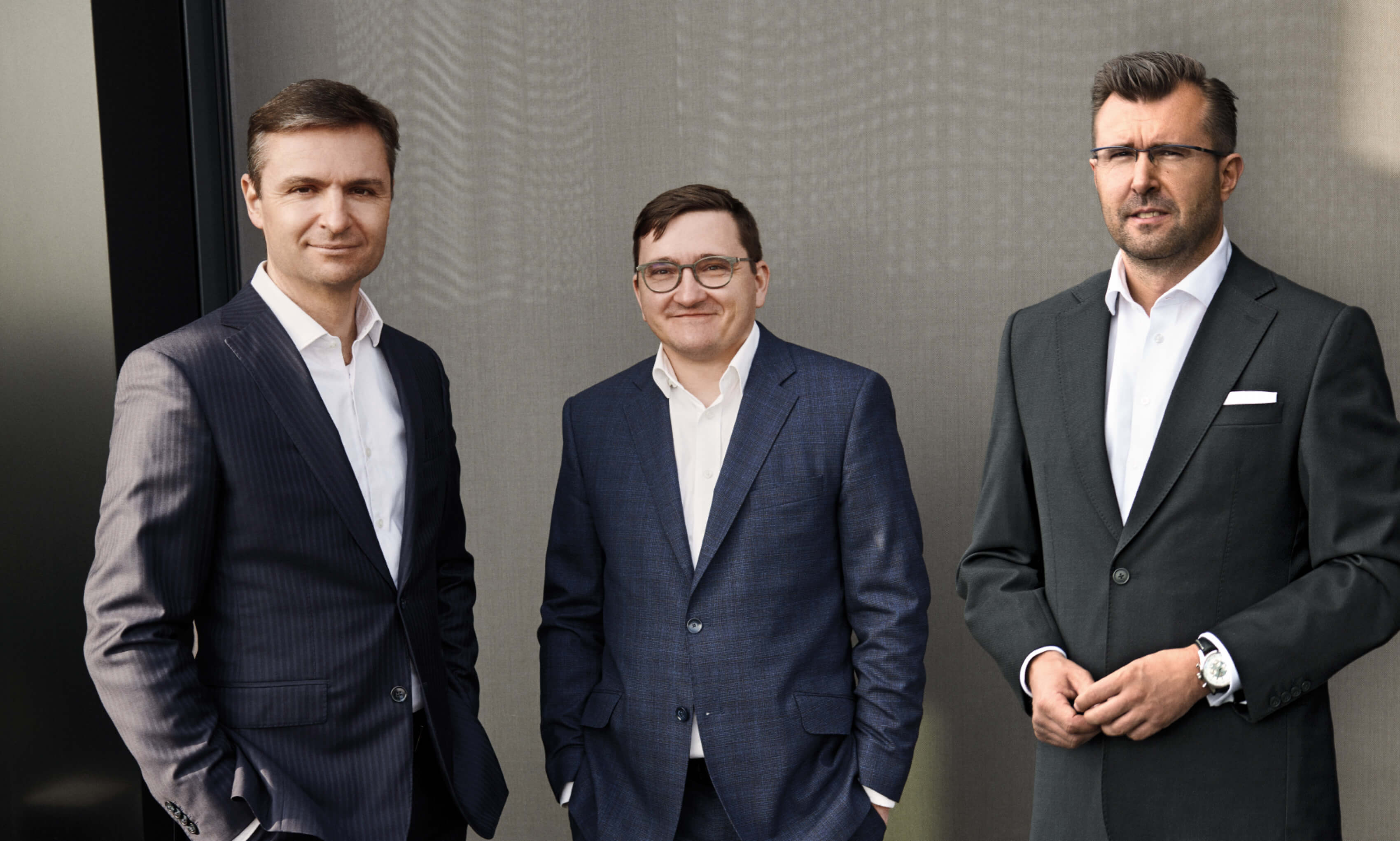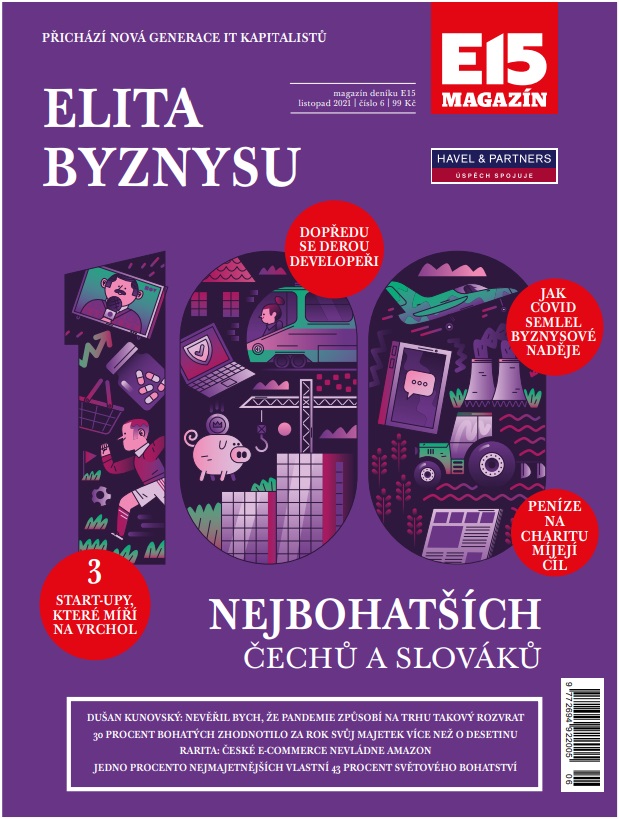
A TRUSTED AND STRONG PARTNER WITH AN EXCELLENT REPUTATION
CONTENTJaroslav Havel
Generational change in leading Czech and Slovak business firms or the challenges arising from the advancing digitalisation of society – these are motives that are increasingly recurring in the work of HAVEL & PARTNERS. This year, the firm celebrated 20 years of existence, and what has kept it at the absolute top of the legal services industry for so long is, according to the firm’s founder Jaroslav Havel, among other things, its ability to perfectly understand its clients’business.
For the last two years, the world has been going through an extraordinary ordeal, particularly in relation to the events surrounding the pandemic. How would you assess the impact of the pandemic on the Czech and, consequently, the world’s wealth in one sentence?
In the world and in the Czech Republic, the total value of assets has increased substantially, especially among the richest, who comprise to three percent of the population.
How has the last year affected the number of Czech and Slovak billionaires and the value of their assets?
Most billionaires have continued to get richer. And more have been added, which is related both to the growth in the size and value of their companies, and now especially to the appreciation of investments in real estate, stocks, cryptocurrencies, commodities or other alternative investments. There are more and more billionaires making money in technology; their numbers have grown much faster in the last two years than in previous years. Overall, the number of billionaires could have increased by another 20 to 30% since mid-2020 to date. The number of rich women is also increasing. And it is not just businesswomen; women are also getting richer thanks to wealth transfers within their families. This trend will continue to strengthen in the future.
How many billionaires are using your services today?
Approximately one third of the richest Czech and Slovak entrepreneurs turn to HAVEL & PARTNERS directly or through their companies, and the interest in our advisory services is constantly increasing in this environment. Private client services are one of the fastest growing parts of our legal and tax practice.
What makes your firm interesting for this prominent clientele?
In addition to reputation, stability and innovation, clients appreciate the seniority of the team and its age mix. Most of the key partners in the group are between 38 and 48 years old. This means that they already have a lot of experience, but they are also still relatively young and highly motivated to continue building the firm and to work with the owners of companies and their successors on an ongoing basis. Building long-term partnerships is one of our core firm values. Our own experience in building an extremely successful firm plays a big role, which we and our partners are ready to share with our clients. After all, who else do you want to take advice from but someone who has built a globally respected and consistently successful firm similar to yours? Revenues must always be managed responsibly and protected accordingly.
You recently mentioned to the E15 daily that you have been dealing with inheritance disputes often lately. Why is that?
It should be noted that we are entering a period when the founders of successful companies whose foundations were laid in the 1990s will gradually leave. Given the busyness of many of them, it is often the case that they are not prepared for the situation. Combined with the differing ideas of their children and partners or failed handover of certain responsibilities, this is increasingly generating disputes not only in relation to assets, but especially over the powers to manage family businesses.
Does this area of law have any specifics?
First of all, it is an emotionally intense discipline. We are the lawyers who have been handling the largest number of M&A transactions on our market for a long time. We know what the value of companies is, how to optimize it, and we can identify their problems. So, we make the most of our extensive transactional experience not only in negotiating the agreement, but also in financing its settlement, which is increasingly common. In doing so, we also look for tax-efficient options that can lead to savings and therefore to a higher level of settlement.
Is there anything that can be done to prevent situations such as inheritance disputes from happening?
The interest in quality solutions to this inevitable life situation is constantly growing among the middle-aged generation of active entrepreneurs, sometimes even among the younger ones. Recently, demand has been greatly escalated by the tragic death of Petr Kellner, and the COVID-19 pandemic has also played a significant role, causing people to think more about how fragile life is. We have seen an extraordinary increase in demand for smart and efficient options for asset transfer, asset management and, in particular, long-term asset protection. Every week we are approached by at least one new client, typically a major business family, with whom we are increasingly discussing the more robust and internationally proven structures of family foundations or private holding companies. Young entrepreneurs are also increasingly interested in effective family law solutions.
What is the younger generation of entrepreneurs dealing with in the area of family law?
Most often it is pre-nuptial agreements or marital property regulation. We were the first large commercially oriented law firm to create a team of experienced lawyers for this area, who, in addition to regulating property relations between spouses and partners, also deal with less lucky partnership situations and family storms, or even the most sensitive disputes involving children.
How are the much-discussed inflation and general price increases reflected in the prices of legal services?
I expect that the prices of “professional services” will definitely increase, especially the prices of high value-added services provided by elite law firms and tax advisors. This is due both to GDP growth, inflation and the impact of an overall increase in client assets and thus the ability and willingness to pay more for top-notch services. And when we compare the price of legal services here and abroad, there is still an incredible gap. By comparison, elite US law firms charge around $600–1,200 per hour, similarly in sterling terms in the UK, and around €200–550 per hour in neighbouring Germany or Austria. However, our partner law firms in most of the former socialist bloc countries, including the Balkans and Ukraine, also charge 15–30% higher rates.
Virtually all human activities have recently been, more or less, significantly affected by advancing digitisation. How is this phenomenon reflected in your work in terms of the increase in new issues raised by digitisation?
We see a huge and growing interest in the legal dimension of the client’s chosen digital transformation method. More than ever before, we are also seeing the emergence of “digital born” services that never had a paper prototype and often approach the customer in a completely new way. For them, legal advice tends to be very interesting and innovative and requires a high level of expertise, which we can offer. The disruption of existing models of service delivery and, in particular, the maximum focus on the end customer, their user experience and the simplicity of the processes, naturally bring new challenges from a legal perspective. We are happy about this, because we can apply our competitive advantage, which, in addition to our exceptional staff and capital, is our ability to understand our clients’ business. Digitisation cuts across all business sectors and thus affects almost all our specialisations.

How does digitisation affect the work of lawyers internally?
Even in the formerly conservative legal profession, you can’t survive if you don’t keep up with technological advances. The use of technology will give us, among other things, more room to use our “human capacity”, especially for complex cases and for building relationships with clients. Here, too, we learn from the best, whether it’s our internal systems, client file management, CRM, software for administrative and simpler legal tasks, or means of remote communication. We have a long-term digital strategy; we are dedicated to online marketing and data mining. Today we are one of the most technologically advanced law firms in Central Europe and we want to continue to build our position as a market leader in this area.
This year you celebrate your 20th anniversary. What are your plans for the future?
We want to continuously improve and continue to be an innovative firm that is a long-term strategic partner to our clients in their business. We have been growing in terms of turnover and personnel for 20 years and we are constantly working to offer the best and most comprehensive services and to improve their quality. With our top team, I am confident that we will build on our 20-year success story and continue to write it, while continuing to contribute to our clients’ success stories.
This interview was published in the E15 Premium – Elita byznysu publication, which HAVEL & PARTNERS supports annually. However, the firm is not involved in the compilation of the ranking of the 100 richest Czechs and Slovaks, which is part of this publication, nor in the creation of an estimate of their wealth. However, by supporting this project, we would like to express our appreciation to the Czech and Slovak entrepreneurs who have created and cultivated free enterprise over the last thirty years, including many of our clients.
